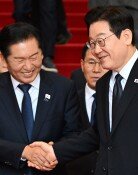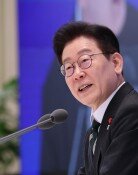Presidents Men Make Inroads into Judiciary
Presidents Men Make Inroads into Judiciary
Posted June. 21, 2005 07:43,
The ruling Uri Party announced on June 20 that it nominated Cho Dae-hyun (53), who was one of the attorneys in the case of President Roh Moo-hyuns impeachment, as the successor to Lee Sang-kyung, a former Constitutional Court justice.
Some in legal and political circles are voicing their concern that the appointment of the presidents attorney as a Constitutional Court justice could compromise the independence of the Court.
Also, another concern is that there are possibilities that those who are in line with the presidents code might be appointed as Supreme Court justices. Ten out of 14 justices will be reshuffled from September this year to July next year because their tenures will end or they will reach retirement age.
Cho will be recommended to President Roh after the National Assemblys approval hearing and vote in the plenary session.
Both Cho and President Roh passed the 17th bar exam and were members of the Eight Men Club, which is a gathering of close colleagues in the Judicial Research and Training Center. Before being elected, Roh reportedly said to Cho in private meetings, Youll be the chief justice if I become president, while describing Cho as the legal professional that I respect the most among those who passed the 17th bar exam.
Cho was one of Rohs attorneys in the presidential impeachment case in March last year.
Some in legal circles said, The ruling party and the president nominated the presidents close associate as Constitutional Court justice probably because they are mindful of the fact that they were ruled unconstitutional last year by the Court for their bid to relocate the administrative capital.
Chun Yeo-ok, spokeswoman for the Grand National Party, said, The nomination is a worrisome decision that can be interpreted as the signal that the judiciary will be packed with those who follow the presidents ideas.
If appointed, Cho will become the second Constitutional Court justice among those who passed the 17th bar exam, following Chun Hyo-sook who was appointed as the first-ever female justice of the Court in 2003.
Some predict that the appointment will make it hard for the Constitutional Court to rule against the government, given that six out of nine justices have to agree on any ruling of unconstitutionality. On the other hand, Oh Young-sik, the Uri Partys vice floor leader, said, Cho was regarded as rational and reformist attorney in what was considered as a conservative legal circle. We also took into account his evaluation on expertise and competence.
Born in Buyeo, Chungnam, Cho graduated from the law school of Seoul National University. He started his career as a judge in Seoul Civil District Court in 1980 after completing the Research and Training Center in 1977. He also served in important positions, including chief of staff for Chief Justice of the Supreme Court, senior judge of Daejeon High Court and the chief of the office of personnel management at the Office of Court Administration.
He has worked as an attorney at the law firm of Yoon and Yang since retiring as the senior judge of Seoul High Court in February 2004.
Yeon-Wook Jung jin0619@donga.com jyw11@donga.com







